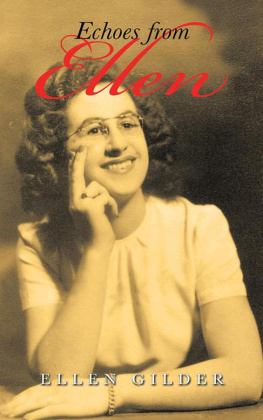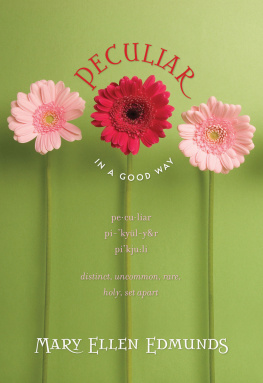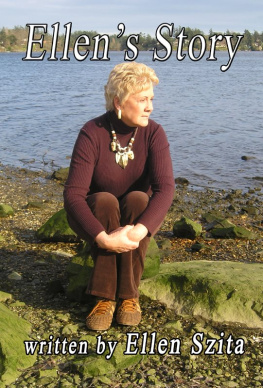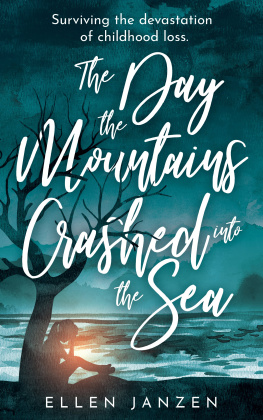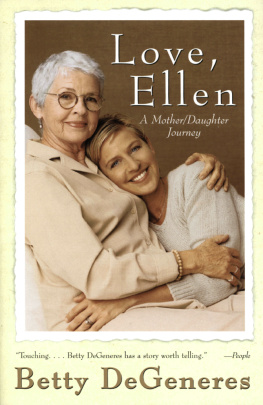Ellen Gilder - Echoes from Ellen
Here you can read online Ellen Gilder - Echoes from Ellen full text of the book (entire story) in english for free. Download pdf and epub, get meaning, cover and reviews about this ebook. year: 2013, publisher: Trafford Publishing, genre: Home and family. Description of the work, (preface) as well as reviews are available. Best literature library LitArk.com created for fans of good reading and offers a wide selection of genres:
Romance novel
Science fiction
Adventure
Detective
Science
History
Home and family
Prose
Art
Politics
Computer
Non-fiction
Religion
Business
Children
Humor
Choose a favorite category and find really read worthwhile books. Enjoy immersion in the world of imagination, feel the emotions of the characters or learn something new for yourself, make an fascinating discovery.
- Book:Echoes from Ellen
- Author:
- Publisher:Trafford Publishing
- Genre:
- Year:2013
- Rating:3 / 5
- Favourites:Add to favourites
- Your mark:
- 60
- 1
- 2
- 3
- 4
- 5
Echoes from Ellen: summary, description and annotation
We offer to read an annotation, description, summary or preface (depends on what the author of the book "Echoes from Ellen" wrote himself). If you haven't found the necessary information about the book — write in the comments, we will try to find it.
Echoes from Ellen — read online for free the complete book (whole text) full work
Below is the text of the book, divided by pages. System saving the place of the last page read, allows you to conveniently read the book "Echoes from Ellen" online for free, without having to search again every time where you left off. Put a bookmark, and you can go to the page where you finished reading at any time.
Font size:
Interval:
Bookmark:

ELLEN GILDER
Order this book online at www.trafford.com
or email
Most Trafford titles are also available at major online book retailers.
Copyright 2013 Ellen Gilder.
All rights reserved. No part of this publication may be reproduced, stored in a retrieval system, or transmitted, in any form or by any means, electronic, mechanical, photocopying, recording, or otherwise, without the written prior permission of the author.
ISBN: 978-1-4907-1085-3 (sc)
ISBN: 978-1-4907-1084-6 (e)
Trafford rev. 08/14/2013
 www.trafford.com
www.trafford.com
North America & international
toll-free: 1 888 232 4444 (USA & Canada)
fax: 812 355 4082
Commit to the Lord, whatever you do,
and your plans will succeed.
Proverbs 16:3

M y birth was child number 7, daughter number 5, a cozy spot, in a small town, a loving home in South Dakotaa summer baby. Papa was a preacher. When I was five months old, he received a call to a rural congregation across the state line in northeast Nebraska. It was in December 1926. It was cold and muddyslow going, I was toldgetting stuck, getting pushed by people-power more than once. One memory the siblings have was of my furnishing the music, though not at all to the tunes they desired. It was for cryin out loud.
I recall my growing up years as mostly serenealways plenty of action and interaction. Plenty of give and takeoh, yes, we had our quota of arguing and disagreements, which were usually short lived, but we also had our built-in playmates and, as we got older, our workmates in doing appointed tasks necessary to function as a family. Three more brothers were added to the family roll call. This blessed my parents with five girls and five boys.
My first eighteen years were spent at this rural home. My parents were strict, but loving. We were surrounded by prayers and the love of God. We were a singing family. Many hours were spent around the piano with our voices filling the space with many hymns and songs. We did a lot of reading and memorizing. Education and further education was encouraged.
A one-room schoolhouse was located a half mile north of our home. The younger students could reap tidbits of knowledge as they heard the older ones recite. The older ones, in turn, could review some things that werent clearly imbedded in their minds.
We are of German descent. As was common at that time, the mother language was spoken at homeas well as English. Certain words did not always elicit translation from German to English. When I was in first grade, I was given the word hoe to spell and make a sentence with it. I had no idea what a hoe was, and right there the all-eight-grades one-room school had a big plusmy brother aloud said Hacke, and I was immediately back on track.
Our drinking water source was a well and a big windmill. This windmill also had steps going up many feet high. Winter brought us lots of blowing snow, which piled up in huge drifts. One of our fun things to do was to climb this windmill and jump into the drifts over and over. As time went on, Papa, who was very versatile, piped this water into a supply tank, which he made out of cement in the basement under the kitchen, and, in turn, installed a pitcher pump next to the kitchen sink to help Mamas needs with fresh water.
The Maytag washing machine (powered with a gasoline engine located in the basement so the muffler could be exhausted into the chimney) was filled with boiling water heated in a copper boiler on the kitchen cook stove. Carrying this water down basement stairs was cumbersome and indeed dangerous, so Papa soldered on a faucet to the boiler, hooked on a garden hose and led it to the washing machine via a round hole cut under the kitchen sink.
Over the years we had three milk cows and also had a separator, so we had generous amounts of cream and milk. We all learned how to milk cows by hand. Also, we raised a pig or two and had chickens for our egg supply and meat. Homemade sausage was a staple as well. One way to preserve some of the fried sausages was to place them in a stone crock and pour rendered lard over them. Hams were preserved with smoke salt.
We had about twenty hives of bees, which provided lots of honey. Mama baked with honey, cooked with honey and canned with honey. Lots of it was sold to supplement the family income. Harvesting this honey was definitely a family project. Bringing the honey-filled frames from the hives to the back porch by wheelbarrow, skimming the wax off with very sharp knives, placing frames into an extractor and filling jars from the spigot involved many hands. Oh yes, the agitated bees did not fail to give a few stings to us in the process, even though protective gear was worn.
We had a huge vegetable garden, and that also was a family project. Canning was a mustoften about five hundred quarts of food varieties for the season. Some of the canned goods were reaped from sour cherry and mulberry trees, raspberry and gooseberry bushes, and rhubarb plants.
Bread baking was a givenfourteen loaves a weekand coffee cake, in which we were blessed to indulge, hot out of the oven, after arriving home from school. And yes, there were also those huge honey cookies baked by the dozens, consumed swiftly.
Mama was a seamstress also. We received hand-me-downs, many in sizes too large for the individual in need of a new outfit. Mama would spend evening hours ripping seams apart, lay patterns on and transform the original garment, custom-made for the recipient. No scraps got thrown away. Quilts were created in various sizes. She darned socks by the dozens. Her crochet needle was flying, turning plain thread into works of art.
Since this place was a rural parish and since the parishioners were farmers, we were able to have services during the week (such as during Lent) in the mornings. At those times we missed classes at the rural school. Mama would always have a delicious meal of hashmade from ground potatoes, onions and home-raised ground ham baked golden brown in the cook stove ovenready so we could eat n run.
We also had Saturday school between 9:00 and 12:00 from age six to fourteen, when we were confirmed. Papa was the teacher. During recess he would come out and play ball with us. Ill always treasure those memories.
As years went by, the two oldest sisters, Esther and Clara, took high school courses by mail. Then they went to Milwaukee, where Esther was employed in a childrens home, while Clara went on to be a nurse. While they were there, the oldest brother, Martin, went to a preparatory school before going on to college to become a pastor.
The high school chosen by sister number 3, Frieda, and brother number 2, Elmer, was a few miles farther from our home town, because it offered normal traininga course which allowed graduates to teach in a rural school. Sister number 4, Lydia, also chose this course. I chose instead to be a bookkeeper and stenographer. There were no school busses as yet. We went by model A Ford and picked up a couple of passengers to help pay the way. As I moved up in age and grade, I became the driver. At that time we could get a school permit at age thirteen. When I graduated, there was a need for an office girl in the high school. I got the job and enjoyed it. I boarded at home. By that time there was school bus service. I worked at the high school one year, and then Papa suggested I get out into the world. I went to Milwaukee, where I could be guided by Esther and Clara, with whom I shared an apartment. I applied for and got a job typing insurance policies. Sister Lydia also had a job in that city. She and I spent many evenings at the roller rink. In this time span Elmer joined the Navy. He was stationed at the Great Lakes Naval Training Station, so we got to see him once in a while in Milwaukee. Brothers 3 and 4, Albert and Carl, also went to preparatory school and became ordained pastors. Our youngest brother, Paul, did not wish to go that route and became a mechanic.
Next pageFont size:
Interval:
Bookmark:
Similar books «Echoes from Ellen»
Look at similar books to Echoes from Ellen. We have selected literature similar in name and meaning in the hope of providing readers with more options to find new, interesting, not yet read works.
Discussion, reviews of the book Echoes from Ellen and just readers' own opinions. Leave your comments, write what you think about the work, its meaning or the main characters. Specify what exactly you liked and what you didn't like, and why you think so.

